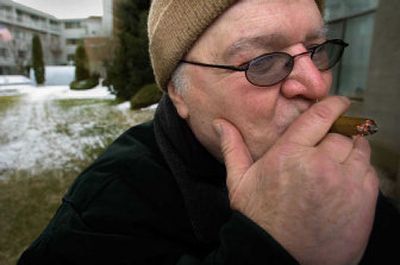Smoke and ire

Dr. Robert Guild believes whoever wrote Initiative 901 “ought to be shot.”
But he’s willing to live with the clean indoor air law provided the state is willing to make an adjustment in the public smoking ban, as well.
“Give us our smoking room back, and all is forgiven,” says the retired physician, who lives at Maplewood Gardens Retirement Apartments, where elderly smokers assisted by wheelchairs and walkers have been forced by the law to amble out to a Quonset hutlike structure they call “the Butt Hut.”
“There’s overhead heating, but it’s very inconvenient, and there are no facilities,” Guild says, adding that restrooms become increasingly important as one approaches his age, 71.
He estimates that about 20 percent of the retirement home’s 190 residents are smokers, and he says they pay good money to live at Maplewood Gardens only to be told they can’t smoke in their own homes.
Guild didn’t start smoking until he retired from private practice and his teaching position at Michigan State University in 1998 and came to Spokane to be close to his daughter and grandchildren.
“Now I smoke cigars (about two a day), and I kind of like them.”
As president of the resident council at Maplewood Gardens, he is concerned that the clean indoor air law is “adversely affecting the disabled residents” of the facility. Before the smoking ban took effect Dec. 8, they went to a well-ventilated smoking lounge provided by management.
Now they have to cross the ice- and snow-covered lawn to the Butt Hut.
‘Unfortunate side effect’
They’re not alone. In assisted living facilities, nursing homes and adult family homes across the state, smokers are coping with the nation’s toughest anti-smoking law, which not only bans smoking indoors but also within 25 feet of doors and windows. Florida doesn’t allow smoking rooms either, but folks can smoke under the eaves or on the patio. California bans smoking within 20 feet of government buildings only.
“I doubt that many people knew that this would exclude any smoking by people living in places likes this,” says Jeff Crollard, attorney for the state’s Long-Term Care Ombudsman program.
Crollard drafted House Bill 3130, allowing smoking rooms in long-term care facilities, provided the rooms have adequate safeguards to protect nonsmokers. But the legislation, introduced by Rep. John Serben, R-Spokane, died in committee.
“It never even got a hearing in health care (committee),” Serben says, as a result of pressure applied to lawmakers by advocates of I-901. He called the law’s effect on elderly, mentally ill or veteran smokers “an unfortunate side effect of the initiative process.”
“Up until the ‘80s, the military encouraged soldiers to smoke. Mental patients were given cigarettes to calm them down,” Serben says.
‘Ongoing battle’
At the Carlyle Care Center in downtown Spokane, clinical director Wendy Coram estimates that 85 percent to 95 percent of residents smoke. The facility provides long-term care, mostly for patients with mental problems.
“They all have to go outside and are complying with the 25-foot rule, so they are in an area with no cover,” Coram says. Others are violating fire code by smoking in their rooms, “an ongoing battle” for the Carlyle staff.
She recalls a time not too long ago when mental health workers actually rolled cigarettes to hand out to patients during the day. The Carlyle had a well-ventilated smoking room available to its residents. That was before the ban took effect Dec. 8.
“You drive by here at night, and you’ll see little 80-year-old ladies bundled up and smoking,” Coram says. “Not a healthy situation.”
Crollard says that long-term care facilities are “skating the line” in terms of liability by letting smokers go outside and that not letting them go can be just as dangerous.
A few weeks ago, Crollard says, a King County nursing home resident was struck by a car while smoking in the parking lot. The 35-year-old woman is a terminal brain cancer patient who is confined to a wheelchair, he says. Smoking is just about the last pleasure she has left.
Recently, a resident in Pierce County was injured in a fire started while he smoked in his bedroom.
“This was the first smoking-related fire in an LTC (long-term care) facility in Washington in years,” Serben says. “I seriously do not think the average member of the public intended for the law to be applied this way.”